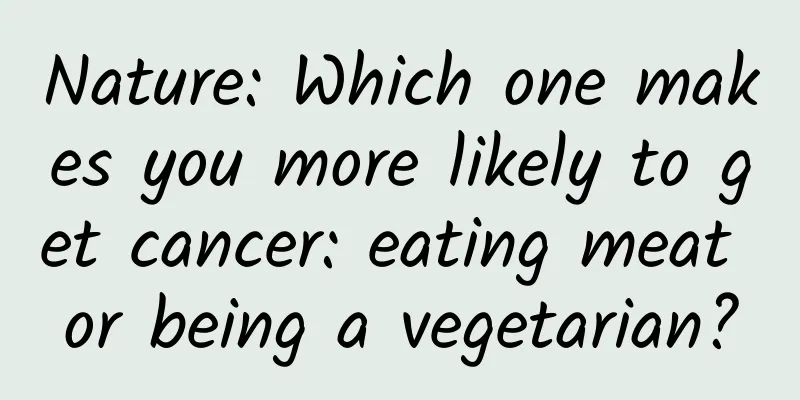Nature: Which one makes you more likely to get cancer: eating meat or being a vegetarian?

|
A study published in Nature on December 22 analyzed tens of thousands of animals in zoos around the world and found that carnivorous mammals are more likely to die from cancer than mammals that only eat plants. Researchers at the Hungarian Academy of Sciences' Ecological Research Center analyzed autopsy records of 110,148 zoo animals (covering 191 species of mammals) to determine their risk of dying from cancer. Researchers found that carnivorous mammals were more likely to die from cancer than mammals that rarely or never ate meat. Of these, even-toed ungulates were the least likely to develop cancer. The order consists mainly of herbivores such as antelopes, sheep, and cattle. The bristle-tailed quoll is one of the species most susceptible to cancer. Cancer was the cause of death in 16 of 28 autopsies of the species in the researchers' study. In contrast, autopsy records of 196 blackbucks (a herbivore native to India) and 213 Patagonian cavies (a large herbivorous rodent) showed no cancer at the time of death. The findings challenge the common view that large animals with long lifespans are most likely to develop cancer because they may have more cells to mutate and more time for mutations to occur. The new research suggests that diet may have a big impact on cancer risk. Of course, more research is needed to confirm whether this phenomenon in captive mammals also exists in wild populations. Researchers say one reason carnivorous animals are more susceptible to cancer may be that raw meat contains viruses that pose a risk of cancer when ingested. For example, some captive lions have cancers linked to papillomavirus from the cattle they eat. Beata Ujvari of Deakin University in Australia, a member of the research team, added that another reason why carnivores are more susceptible to cancer may be that they are more susceptible to pollutants because the higher up the food chain, the more concentrated the pollutants are in the animals' bodies. Additionally, carnivores’ diets are high in fat and low in fiber, resulting in lower diversity of gut bacteria than herbivores, which has similarities to human cancer risk factors. Ujvari points out that the fact that carnivorous mammals are more susceptible to cancer does not necessarily mean that meat-eaters are also more susceptible to cancer, "because we live differently from other mammals and do not tend to eat raw meat. However, some human studies have linked meat consumption to an increased risk of cancer." Researchers currently don't know why even-toed ungulates are unusually resistant to cancer, but a better understanding of this issue could help protect humans from the disease. In Ujvari's opinion, the low-fat, fiber-rich plant diet of even-toed ungulates may be a factor that makes them less susceptible to cancer. They may also have evolved natural resistance to cancer to compensate for the extra cancer risk associated with their large size. "Understanding how they fight cancer may help develop cancer treatments for humans," Vincze said. Source: Science Popularization China |
<<: If you are not good at physics, please do not click on this article
Recommend
Analysis of mobile Internet monetization methods: application distribution (Part 1)
For all developers or companies working on mobile...
Unveiling the evolution of “artificial life”: Do genetic coding and electronic engineering both follow Moore’s Law?
Computer programming and gene synthesis may seem ...
How to establish a data analysis logic system for information flow advertising?
I believe everyone is familiar with information f...
Viable business models for live streaming products: I have summarized 13
Judging from user behavior, the common live broad...
Sogou responds to Tencent's acquisition offer. How much will Tencent pay for Sogou?
Many investors will pay attention to the stock pr...
Motorola Reflection: Ruined by Cultural Change
Ted C. Fishman, editor of Chicago Magazine, recen...
Is it better to cut your nails into a square or round shape? Most people probably cut their nails wrong
In our daily lives, nail trimming seems to be a t...
Wanshi E-commerce · Douyin Store Natural Flow Online Practical Course [2022 Edition], teach you how to run a Douyin store from scratch
Wanshi E-commerce · Douyin Store Natural Flow Onl...
What information is needed to register a mini program? What information is needed to apply for a mini program?
Q: What information is needed to register the min...
Oreo Advertising Creative Collection
I don’t like cookies, especially sweet cookies, s...
Academician Zhong Nanshan: During the epidemic, it is very important to protect your immunity!
Reviewer of this article: Chen Haixu, Deputy Dire...
Zhang Yiwu-Leadership Upgrade and Enterprise Process Management (Process is King)
Zhang Yiwu-Leadership Upgrade and Enterprise Proc...
Control Cat Short-term Basic Training Camp, Control Cat Double Plan
Introduction to the resources of the Kongpanmao s...
5 key points to master user operations in community operations
The definition and goals of user operations in co...









